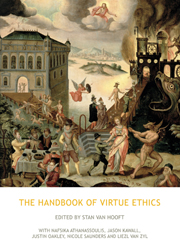Book contents
- Frontmatter
- Contents
- Acknowledgements
- 1 Introduction
- PART I NORMATIVE THEORY
- PART II TYPES OF VIRTUES
- 14 What virtues are there?
- 15 Intellectual virtues
- 16 Virtue, reason and wisdom
- 17 Integrity
- 18 The ends of courage
- 19 Wit
- 20 Humility, Kantian style
- 21 Love, sex and relationships
- 22 Forgiveness and forgivingness
- 23 The virtue of justice revisited
- 24 The virtues of African ethics
- 25 Classical Confucianism as virtue ethics
- 26 Ethics and virtue in classical Indian thinking
- 27 Mindfulness, non-attachment and other Buddhist virtues
- 28 Virtue in Islam
- PART III APPLIED ETHICS
- PART IV THE PSYCHOLOGY OF VIRTUE
- Contributors
- References
- Index
23 - The virtue of justice revisited
from PART II - TYPES OF VIRTUES
- Frontmatter
- Contents
- Acknowledgements
- 1 Introduction
- PART I NORMATIVE THEORY
- PART II TYPES OF VIRTUES
- 14 What virtues are there?
- 15 Intellectual virtues
- 16 Virtue, reason and wisdom
- 17 Integrity
- 18 The ends of courage
- 19 Wit
- 20 Humility, Kantian style
- 21 Love, sex and relationships
- 22 Forgiveness and forgivingness
- 23 The virtue of justice revisited
- 24 The virtues of African ethics
- 25 Classical Confucianism as virtue ethics
- 26 Ethics and virtue in classical Indian thinking
- 27 Mindfulness, non-attachment and other Buddhist virtues
- 28 Virtue in Islam
- PART III APPLIED ETHICS
- PART IV THE PSYCHOLOGY OF VIRTUE
- Contributors
- References
- Index
Summary
Some of the earliest Western ideas about the virtues of character gave justice a prominent position, but if moral philosophy has made any progress at all in the past two centuries, we might think it worthwhile to reconsider what that virtue involves. Kant seems (even to most non-Kantians) to have crystallized something important to our relations with others in formulating a proscription against treating others merely as means. And twentieth-century moral and political theory put the justice of social institutions in the spotlight in an unprecedented way. Here I explore the significance of these developments for what it is to be a just person (the nature of “individual justice”) as it was originally understood, within the eudaimonist virtue-ethical theories of the ancient Greeks. By any standard, ancient thinking about individual justice seems to have been incomplete in important ways; perhaps, in virtue of these advances in moral theory, we are in position to enrich our thinking about it.
My plan for this exploration begins with a brief (and manifestly incomplete) survey of ancient thinking about justice as a virtue. My aim in this survey is critical: I seek to bring out places where augmentation or supplementation of ancient theorizing about the virtue of justice might be of most use to us. Then I turn to consider how Kantian and post-Kantian ethical thought might help with that augmentation.
- Type
- Chapter
- Information
- The Handbook of Virtue Ethics , pp. 265 - 275Publisher: Acumen PublishingPrint publication year: 2013

